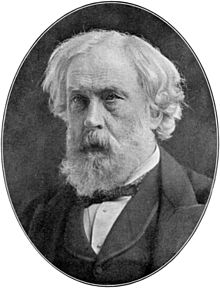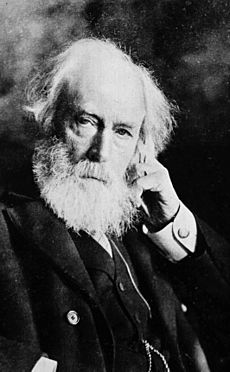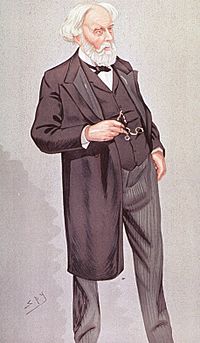Samuel Wilks facts for kids
Quick facts for kids
Sir Samuel Wilks, Bt
|
|
|---|---|
 |
|
| Born | 2 June 1824 |
| Died | 8 November 1911 (aged 87) |
| Nationality | British |
| Alma mater | Guy's Hospital |
| Scientific career | |
| Fields | medicine |
Sir Samuel Wilks (born June 2, 1824 – died November 8, 1911) was an important British doctor and writer. He was known for his work in medicine and for writing about other famous doctors. He received many honors for his contributions to health.
Contents
Early Life and Education
Samuel Wilks was born in London, England, on June 2, 1824. His father, Joseph Barber Wilks, worked as a cashier. Samuel went to Aldenham School and University College School. After school, he started training to become a doctor with Richard Prior in Newington.
Medical Career
In 1842, Samuel Wilks began studying medicine at Guy's Hospital. He finished his medical degree in 1848. In 1853, he started working as a doctor at the Surrey Infirmary.
He returned to Guy's Hospital in 1856. There, he first worked as an assistant doctor and helped manage the hospital's museum for nine years. Later, in 1857, he became a full doctor and taught medicine. From 1866 to 1870, he was an examiner for medicine at the University of London. He also examined medical students at the Royal College of Surgeons of England from 1868 to 1875.
Key Medical Discoveries
Sir Samuel Wilks made many important discoveries in medicine.
Understanding Gut Problems
In 1859, Wilks was the first to identify a condition called ulcerative colitis. This is a long-term disease that causes swelling and sores in the large intestine. He showed that it was different from a common infection called dysentery. Years later, in 1931, another doctor named Sir Arthur Hurst confirmed Wilks's findings.
Wilks studied a 42-year-old woman who had been sick with diarrhea and fever. After she passed away, he examined her body. He found that her colon (large intestine) and the end of her small intestine were very swollen and had many sores. This helped him understand ulcerative colitis better.
Discoveries About Hair and Airways
In 1852, Wilks also described a hair problem called trichorrhexis nodosa. This condition causes small bumps or nodes to form along the hair shaft, making the hair break easily. A Hungarian skin doctor, Moritz Kaposi, later gave it its name in 1876.
In 1957, Wilks provided the first detailed description of a condition affecting the upper airways, which is now known as tracheobronchopathia osteochondroplastica.
Brain and Nerve Conditions
In 1868, Wilks wrote about the specific mental changes seen in people with paraplegia (paralysis of the lower body). These symptoms were later named Korsakoff's syndrome.
He also described the first known case of myasthenia gravis in 1877. This is a condition that causes muscle weakness. At the time, it was called "bulbar paralysis."
Working with Famous Doctors
Wilks worked with and wrote about three very famous doctors from Guy's Hospital. They were Dr. Thomas Addison, who discovered Addison's disease; Dr. Richard Bright, who discovered Bright's disease; and Dr. Thomas Hodgkin, who discovered Hodgkin's lymphoma.
After Dr. Addison died in 1860, Wilks took on the important job of examining medical samples from all over the country. He did this to confirm cases of Addison's disease. This helped him gather a large collection of information about the disease. He also rediscovered and confirmed the existence of Hodgkin's lymphoma. He made sure to give Dr. Hodgkin credit for his original discovery.
Honors and Recognition
Sir Samuel Wilks received many honors for his work. In June 1870, he was chosen as a Fellow of the Royal Society. This is a very prestigious group for scientists.
He also led several important medical societies:
- President of the Pathological Society of London (1881–1882)
- President of the Neurological Society (1887)
- President of the Royal College of Physicians (1896–1899)
Wilks was also a member of the Senate of the University of London from 1887 to 1900. He served on the General Medicine Council from 1887 to 1896.
In 1897, he was named Physician Extraordinary to Queen Victoria. This meant he was a special doctor to the Queen. The next year, he was given the title of Baronet. This is a special honor that makes him "Sir Samuel Wilks."
Later Life and Legacy
Later in his life, Sir Samuel Wilks had a stroke, which left him unable to move his lower body. He passed away at his home in Hampstead on November 8, 1911, at the age of 87. He had married Mrs. Elizabeth Anne Prior, but they did not have any children. Because he had no children, his title of Baronet ended after his death.
Sir Samuel Wilks is remembered for his important contributions to understanding and identifying many diseases, helping to improve medical knowledge for future generations.



